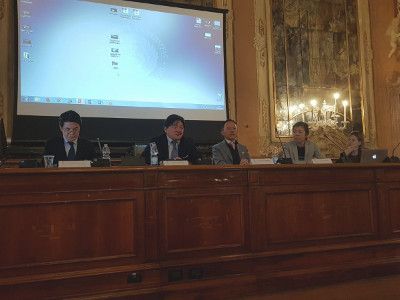On February 23rd in Aula Magna Silvio Trentin, students studying Japanese at Ca’ Foscari had the great opportunity to meet with the most influential representatives in the world of Japanese work in Italy: Takeshi Yamanaka, Vice President of the Chamber of Japanese Commerce and Industry in Italy (CCIGI) and President of Mitsubishi Italia Spa, Kaneyuki Iseda, Vice President of the Chamber of Commerce and General Manager of he Bank of Tokyo-Mitsubishi UFJ (Milan Branch), Tomoyuki Sugai, President of “Mitsubishi Electric Europe B.V. (Italy Branch)” and CCIGI Counselor, and Saeko Tani, Chief Secretary of the Economic Commerce Office of the Japanese Embassy in Rome.
The guests explained that the excellent standard of students at Ca’ Foscari was the element that inspired the collaborations between the Chamber of Japanese Commerce and Industry and the University; the exchange and internships were born after the summer 2016 agreement was signed with CCIGI and its members that surpass 190. Thanks to the then President Yamanaka, students have been given opportunities by bringing young people closer to institutions and Japanese businesses both in Italy and in Japan.
Human capital and individual people are the most important resources for a multinational corporation such as Mitsubishi Corporation, whose values are transparency, the promotion of local companies, and respect for the environment. The group with more than 200 branches and subsidiaries around the world also controls several companies in Europe. At the end of the interventions the guests were divided to have a face-to-face discussion with the students, who were able to directly ask for clarifications and advice regarding their future in the Japanese and global world of work.
Marcella Mariotti, professor of Japanese Language (Commercial Negotiation) and President of the Association of Teachers of Japanese Language in Europe (AJE), as well as the creator of several projects of the Department of Asian and Mediterranean African Studies among Ca’ Foscari Desk Japan (Italian Chamber of Commerce, Tokyo), and the new Master in Global Business Japan (2018/19) answered some questions regarding the internships and job prospects offered to the students of Japanese at Ca’ Foscari:
What are the most exciting opportunities for internships?
Certainly the opportunity to work with Japanese companies in Italy and Italian companies in Japan, and to participate in the Ca’ Foscari desk in Tokyo at the Italian Chamber of Commerce. Through these experiences you can network with the most prestigious Italian and Japanese companies operating between Italy and Japan. It is good to remember that this is often, as is the case of the Mitsubishi group, multinational companies that, through the control of thousands of other companies, offer the possibility of recommending or directing interns to a relevant job within their field of study not only in Japan or Italy, but on a global scale. Moreover, the industrial relations between the two countries extend to such a variety of sectors that it is always possible to find a job that unites your skills with personal passions. It is important to remember that Ca’ Foscari offers the possibility of signing agreements with any company of interest to students: this experience therefore should not be understood in reductive or instrumental terms, not as an isolated path to obtain necessary credits, but to begin to craft your own future through targeting internships. Also repeated and not limited to credit hours, but possibly by participating in an entire project, in the sector or in the company you are most interested in.
What advice would you give to students who are approaching the world of work through an internship or a job for the first time?
I would advise you to really reflect on your future, and begin to make the first moves towards an internship and the possibilities that the University offers; it is fundamental to be resourceful in seeking your own personal development and to profit from the opportunity by being more independent. In the US and in Japan, University courses facilitate the shift into the world of work. Unfortunately, in Italy this hasn’t happened yet. For this reason, students need to be more proactive, rather than just waiting until the end of their studies.
Students of Japanese also have a great advantage: the passion they put into studying. If this same commitment is put into their future career prospects, whether it be in academic research or the world of industry and entrepreneurship, there is no doubt that many opportunities will open up to achieve a sense of personal fulfillment.
Teresa Trallori










